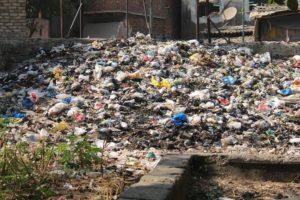NGT issues disposable plastic ban in Delhi NCR
Alongside recommendations for green waste management practices, the National Green Tribunal on Friday banned the use of disposable plastic in Delhi NCR from next year.
The National Green Tribunal (NGT) in India issued a ban on the use of disposable plastic in the National Capital Region (NCR) that will come to force from January, 2017. It has also instructed the administration to direct initiatives towards reducing dumped waste. However, the Okhla waste-to-energy plant is set to continue operations even as it has been alleged of using illegal mass burning technology leading to air pollution. The directions for the ban and adoption of eco-friendly measures came after a plea was filed by Sukhdev Vihar Residents Welfare Association. They had hoped for closure of this waste-to-energy plant, which they found violating the Delhi Master Plan 2021.
The bench which issued directions for eco-friendly operations for the Okhla plant along with two other plants at Gazipur and Bhalswa was headed by NGT Chairperson Swatanter Kumar. A joint inspection team was also part of the team. The tribunal criticised the South Delhi Municipal Corporation (SDMC) over its provision of “inaccurate” data on various kinds of wastes generated in the national capital daily. “We direct that use of disposable plastic is prohibited in entire NCT of Delhi. The Delhi government shall take steps for storage and use of plastic materials with effect from January 1, 2017,” said the bench, informing of the ban on disposable plastic.
Although the NGT was also informed by the welfare association that as per observations of the National Environmental Engineering Research Institute, mass burning technology should be stopped immediately, the bench allowed the Okhla plant to continue operations. The bench added, “All the corporations, DDA and other public authorities including NCT of Delhi are directed to take immediate steps for reduction and utilisation of dumped waste.” In reference to three of the major dumping sites in the capital city – Okhla, Gazipur and Bhalswa – the tribunal stated, “Each of these sites is a depiction of mess that can be created for environment and health of people of Delhi.” In another instruction, the NGT asked the Delhi government to make operational the Shastri Park Waste Disposal Plant in six weeks after the DPPC said it required an environmental clearance.
The bench laid out fines and reminded plants of existing laws, while also adding that environment compensation would be imposed on the vegetable vendors and slaughter houses for throwing garbage in public places. The government has also been asked to tweak all construction-related tenders to include a condition of use of all waste materials released by the plants for road construction.
Baby steps
Although the ban of disposable plastic in Delhi NCR is seen as a welcome step, in another part of the world, France has pushed the ban on plastic much further. In a recent measure undertaken by France to conserve the environment, the country has become the first in the world to ban all plastic crockery and cutlery. The new law, which is being projected as being enforced from 2020, is a part of the country’s Energy Transition for Green Growth Act, the same legislation that had outlawed plastic bags in grocery stores and markets beginning July.
The exponential growth in use of plastic items and bags has led to significant environmental concerns, which stems from dumping of waste into oceans, including damage to aquatic life and fatal consequences to marine and land animals. As reported earlier this year by the World Economic Forum (WEF), by the year 2050, oceans will have more plastic waste than fish, if the current patterns of consumption remain unchanged. In such a situation, every step towards reducing the use of plastic in India, which has been reported as among the highest in the world, comes as a welcome one.










